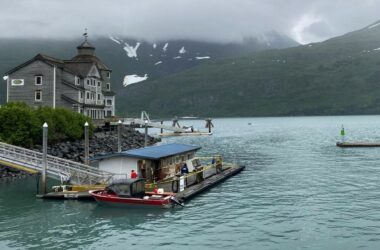Governor Bill Walker’s office has released what they believe will be the impacts of a partial Alaskan government shutdown which would go into effect if a budget deal is not reached by July 1.
Department of Administration:
- Delay or cancel vendor purchasing and payments on supplies – across the entire state this will impact many small businesses that rely on an estimated $1.7 million daily in state contracts
- Hundreds of state leases will not be paid in full for the duration of the closure, potentially creating hardship for private lessors and taking several million dollars out of the economy for each month the shutdown persists
- Critical state I/T and communications equipment would go unmaintained and reliability of those services would decrease
- The Office of Public Advocacy would limit advancing appeals and their caseload backlogs will grow with the elimination of support staff during the shutdown
- The Public Defender Agency would see their caseload backlogs grow
- Reaction time for emergency support services delivered by DOA would be impaired
- Progress on the state’s new financial and payroll administrative system , the Integrated Resource Information System or IRIS, replacing 30+ year old legacy systems will be halted right at the critical juncture of implementation after years hard work, imposing additional costs and delays to a $80+ million dollar investment
- Skeleton crews will be established in divisions such as Personnel, Finance, General Services, Risk Management, and Enterprise Technology Services to support only those state functions related to life, health, and safety
- Alaska Public Offices Commission (APOC), tasked with oversight on elected officials and lobbyist, would not have staff to process cases and would therefore close for the duration of the shutdown
- Administrative appeals would largely go unscheduled if not funded through federal programs
- Bargaining of labor contracts would cease until government reopens this function
- Employee grievances and (grievances and) letters of agreement will not have agency staff to respond
- Grant to supply “blind-friendly” accessibility to news and information services would no longer be available
- Access to state surplus goods would not be available
- Alaska Public Broadcasting Commission would not receive any grant funds for local TV or radio
- State employee recruitment resources will be slowed to a near standstill for current and future job seekers
Department of Commerce, Community and Economic Development:
- The divisions most affected are determined by the percentage of unrestricted general funds received, not by the value of the work or responsibilities. The highest impacts would be seen by communities, businesses, and individuals who engage with or receive services from the Division of Community and Regional Affairs (DCRA) and the Division of Economic Development (DED). In DCRA, services reduced or cut would include rural utility assistance, the Local Boundary Commission, various planning, research and analysis functions, the Alaska Native Language Preservation Council, and a curtailment in both grants administration and local government support functions. In DED, economic development activities would be suspended, although most loan operations would continue (Commercial Fishing Revolving Loan program, etc.).
- Layoff letters have not been sent to state corporations that do not fall under the personnel act. Accordingly, there would be minimal impact to services provided by the Alaska Energy Authority, the Alaska Industrial Development and Export Authority, the Alaska Gasline Development Corporation, and the Alaska Seafood Marketing Institute.
- The remainder of DCCED agencies are not funded by unrestricted general funds through the operating budget, and it is anticipated would be able to recall the majority of their employees. These include the Alcoholic Beverage Control Board, the Division of Banking and Securities, the Division of Corporations, Business and Professional Licensing, the Regulatory Commission of Alaska, and the Division of Insurance. DCCED anticipates minimal impact to services from these divisions. For example, the Alcoholic Beverage Control Board would continue to regulate sale of alcohol and proceed with regulation of marijuana.
Department of Corrections:
- There will be no impacts in this department as it operates Alaska’s prison system.
Department of Education & Early Development:
A contingency plan has been developed in case of a partial government shutdown
- The child nutrition services unit, which organizes summer feeding programs for children, will continue to operate because it is not funded by state general funds.
- Teacher certification unit, the Professional Teaching Practices Commission, the Alaska Commission on Postsecondary Education, and the Alaska Student Loan Corporation will continue to operate.
With available funds, the department can cover three of 12 monthly payments to school districts during fiscal year 2016, which coincides with the school year.
- The department can cover approximately the first quarter of funding for schools in juvenile detention centers, grants to boarding schools, and the Alaska School for the Deaf and Hard of Hearing.
- The department can cover one of three annual payments to school districts for student transportation. The contract for inspections of school buses will be fully funded to assure student safety.
- The Alaska State Library and the Alaska State Archives will not operate. The staffing of the Alaska State Museum will be sufficient to support the State Libraries, Archives and Museums (SLAM) ongoing construction project in Juneau.
Department of Environmental Conservation:
The following DEC services critical to Alaskans’ life, health, and safety will be operational during a shutdown:
- Division of Spill Prevention and Response: DEC would need to maintain a level of preparedness to respond in the case of an oil or hazardous substance release. This division is primarily funded through the Prevention Account of the Oil and Hazardous Substance Release Prevention and Response Fund and therefore would not be affected.
- Environmental Health Laboratory: If there is a health crisis, like a major foodborne illness outbreak, DEC would need to recall laboratory staff.
- Air Monitoring and Quality Assurance Program: This program is responsible for forecasting the impact of weather on air quality pollution that poses a potential health hazard to people. One meteorologist position would be retained to issue air quality advisories.
- Remote Maintenance Workers: Staff frequently respond to breakdowns of drinking water systems in rural communities. DEC would seek to enter into local agreements to cover emergency events during a government shutdown.
Department of Fish & Game:
The Alaska Department of Fish & Game has begun analyzing the impacts from the potential shutdown and determined the Division of Commercial Fisheries would be hit the hardest.
- The division would maintain the core staff involved in active management of commercial fisheries.
- Field staff deployed to remote Alaskan areas doing work such as operating weirs and other projects would be returned to their primary duty station and laid off using a phased approach from July through August.
- Other services including regional support, front counter support to the public, laboratory services, data support and other related services will be curtailed or halted.
In addition to these impacts, the following services provided by ADF&G will also be significantly curtailed or halted effective July 2:
- Title 16 permits issued by the Division of Habitat.
- Subsistence harvest surveys conducted by the Division of Subsistence.
- Support to the Board of Fisheries and Board of Game as well as advisory committees.
Department of Health & Social Services:
- There will be no impacts to this department “Due to the critical health and safety implications of the services that are provided” for Alaskans.
Department of Labor and Workforce Development:
- All staff of the Alaska Labor Relations Agency, Wage and Hour Administration, and the Alaska Workforce Investment Board would be laid off during the government shutdown. The closures of those programs could result in delayed resolution of disputes and elections, and unresolved allegations of wage and hour violations.
- In addition, the department will be unable to distribute grants in support of the Alaska Construction Academy, Independent Living Program, General Education Development diplomas, and the Helmets-to-Hardhats veterans training program.
Department of Law:
- Staff would be reduced in civil and criminal divisions,
- The department anticipates maintaining a skeleton crew to deal with civil matters, while trying to prioritize resources towards public safety and child protection.
Department of Military and Veterans Affairs:
- Alaska National Guard: uniformed Guard members will continue their duties as normal. DMVA environmental reviews by state employees will continue, and some state personnel will remain on staff to provide required services for federal facilities.
- Division of Homeland Security and Emergency Management: emergency monitoring staff will consist of three emergency management specialists working from the State Emergency Operations Center. If a disaster event necessitates response activities, appropriate DHS&EM and other state government emergency response personnel will be recalled to address the immediate life, health and safety needs of the effected Alaskans. The recalled staff will be funded through the Alaska Disaster Relief Fund. During the course of a shutdown, DHS&EM will cease processing grants for individuals and communities for disaster-related response and preparation activities.
- Office of Veterans Affairs: all Office of Veterans Affairs staff will be laid off. Additionally, grants to veteran organizations for 17 Veterans Service Officers statewide will not be renewed when they expire June 30. This will leave Alaska’s approximately 75,000 veterans without assistance to claim the benefits they have earned.
- Division of Administrative Services: the Division of Administrative Services will recall necessary staff for federal reimbursement processing, and to conduct the fiscal year close-out requirements.
- Alaska Military Youth Academy: initially, all Alaska Military Youth Academy staff will be laid off. However, AMYA will recall the essential staff needed to complete the current training cycle. Cadets will graduate in August, at which point remaining AMYA staff will be laid off. In the event of a shutdown, DMVA will be required to notify the National Guard Bureau that it can no longer perform the activities required for the AMYA program. The program will be terminated, and it is unknown if Alaska will receive funding for subsequent classes.
Department of Natural Resources:
- DNR would continue to fight wildfires, operate the Alaska Volcano Observatory and the dam safety program, the department stated even though they wrote they anticipate, “significant impacts on activities that occur on state lands and water but will ensure necessary work continues to protect the life, health and safety of Alaskans.”
- Public information centers in Anchorage and Fairbanks would close as of July 2.
Department of Public Safety:
This department operates the Alaska State Troopers and trains Village Public Safety Officers and would maintain those duties “due to the critical nature of the services that we provide.”
Department of Transportation and Public Facilities:
Without a fully funded operating budget the following ADOT&PF services will be impacted after June 30, 2015:
- Alaska Marine Highway System: All 11 vessels will enter layup status and will not provide passenger service.
- Weights and Measures: These services will be limited.
- Road Maintenance and Operations: Preventative Maintenance funded by the federal government on state highways will continue into September. Emergency response will be available for signal and general highway issues.
- Public Facilities: Will provide emergency monitoring and response only.
- Support staff and accounting: Staff will be reduced to paying bills and processing payroll.
The following ADOT&PF services will continue to be provided:
- Whittier Tunnel: Will continue to operate as normal.
- International Airports: Ted Stevens Anchorage International and Fairbanks International airports will continue to operate as normal.
- State Airports: Part 139 certificated airports that serve larger passenger and jet aircraft will operate with reduced hours.
- Planning, Design and Construction: All projects currently being planned, designed and are under contract for construction will continue.
- Commercial Vehicle Enforcement: Overweight/oversize permitting will be available.
Department of Governor and Lieutenant Governor:
If a budget compromise is not reached by July 1:
- Those offices would stop answering constituent requests.
- Halt investigations by the Human Rights Commission.
- Leave political candidates unable to complete filing paperwork with the Division of Elections.
- Stop review of any voter petitions.
These are things that may happen if the Legislature cannot get a 3/4 vote to fully fund Alaska’s operating budget for 2016 which begins on July 1.






